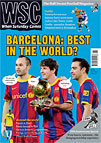 James Eastham discusses the newest scandal which has shaken French football
James Eastham discusses the newest scandal which has shaken French football
It was all going too well. The France national team’s remarkable rebirth under Laurent Blanc came to an abrupt halt last month following the publication of transcripts from tapes that threatened not only to end the former Manchester United defender’s impressive start as les Bleus manager, but also engulf French football in a bigger scandal than the World Cup players’ strike.
Secretly recorded at a French FA meeting on November 8 before somehow finding their way into the hands of investigative website mediapart.fr, the recordings revealed extracts of a conversation between Blanc, French technical director François Blaquart and other members of the coaching staff. On the agenda was dual nationality, a talking point because many young footballers in France play in national age-group categories before going on to represent other countries at senior level.
Blaquart was quoted as saying he favoured the introduction of quotas, as long as it was kept quiet. “Ideally we’d decide, unofficially, to pick fewer lads who might end up changing nationality. But we mustn’t say anything.” The conversation moved on to the sort of footballers France produces. Blanc said: “You get the feeling they’re always the same: big, strong, powerful. Who are big, strong and powerful at the moment? Black players. That’s how it is. We need to change our approach, take account of our own culture. The Spanish tell me: ‘We don’t have any problems, because we don’t have any black players.’”
The tone alone left an unpleasant taste, aside from the question of what Blanc meant by culture – was he talking about football, or something wider? Within days two enquiries were launched, while Blanc’s reputation came under scrutiny for the first time in a previously unblemished career.
As usual, it was left to members of the 1998 World Cup-winning squad to drive the ensuing debate. With Blanc one of their own, their views were sought more eagerly than ever. Two groups emerged: those supporting Blanc included Christophe Dugarry, Bixente Lizarazu, Marcel Desailly and Didier Deschamps, while the most critical of the former centre-half were Lilian Thuram and Patrick Vieira. Dugarry reacted angrily to Thuram’s condemnation of their former team-mate, recalling a story from the dressing room on the night of France’s World Cup victory: “I was having a photo taken with Vincent [Candela], Liza, Zizou; the players I was a bit closer to, if you like. I heard Lilian Thuram say, ‘Come on, blacks, let’s take a photo together.’ Franck Leboeuf responded: ‘What did you say, Lilian? Can you imagine if we’d said ‘Come on, whites, let’s have a photo together. How would you have reacted?’”
The tensions within a squad held in almost celestial esteem within France threatened to become the central story. Emmanuel Petit was close to tears as he delivered a down-the-lens piece on L’Équipe’s TV channel, imploring Zinedine Zidane to heal the wounds. Breaking his silence ten days after the affair began, Zidane backed Blanc: “He spoke for three minutes during a three-hour meeting. Should he quit as national team boss? Of course not. I don’t need to check whether he’s racist, because I know he isn’t for a single second.”
Behind the drama lie two issues. The first, dual nationality, is a non-issue. As Thuram and others have pointed out, it was ridiculous for Blanc and some of his colleagues to take such a hardline stance, for the simple reason that anyone good enough will almost certainly choose to play for France. The vast majority of those that play for other countries do so once they accept their chances of representing France are over.
The question of whether France has favoured physical qualities over technical skills in recent years is more pertinent. Real Sociedad’s Antoine Griezmann, who was born in France but joined Real Sociedad at 14 and is now a member of their first team, gave an insight into the failings of the French system: “Sochaux, Lyon, Auxerre, St Étienne and Metz all turned me down. It was always down to my size, even though they said I was above-average technically.” In February, Marvin Martin, the diminutive Sochaux playmaker who heads Ligue 1’s assists chart this season, revealed France’s national training base at Clairefontaine refused to accept him for similar reasons when he was 13. The irony, considering that France’s soul-searching over style has been inspired by Spain’s success, is Martin is nicknamed “little Xavi”.
The disappointment is that Blanc entertained the notion of quotas. Look at the 1998 World Cup-winners he played alongside: Desailly was born in Accra, Thuram in Pointe-à-Pitre, Vieira in Dakar. Karembeu is from New Caledonia. Robert Pirès has a Portuguese father and Spanish mother. Zidane could have played for Algeria.
Blanc was better placed than anyone to point out what France stood to lose from limiting their intake of dual-nationality players. The regret – which he must feel more strongly than anyone now – is that he didn’t.
From WSC 292 June 2011